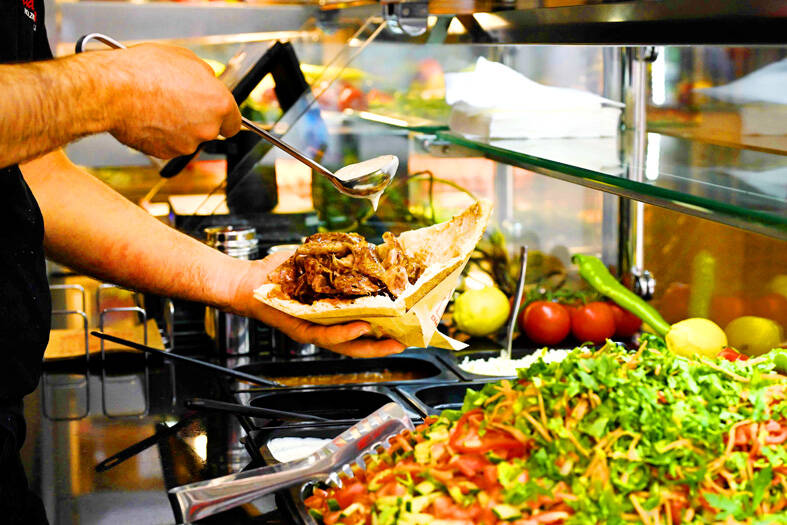A row has erupted between Turkey and Germany over what constitutes a doner kebab, with Berlin objecting to a Turkish push for protected status for the iconic snack.
The humble doner, made with thinly sliced meat cooked on a vertical rotisserie, has its origins in Turkey, but is also beloved in Germany after being introduced there by Turkish migrants.
In April, the Turkey-based International Doner Federation (Udofed) filed an application to the European Commission to grant the doner kebab Traditional Speciality Guaranteed status.

Photo: AFP
From the exact meat and spices to the thickness of the knife used to slice the meat, Udofed wants the definition of the doner to adhere to a strict list of criteria.
If successful, the application would bar businesses in the EU from using the name doner kebab unless they meet the criteria, giving it the same protected status as Italy’s bufala mozzarella or Spain’s Serrano ham.
In its application, Udofed hails the doner’s origins during the Ottoman Empire, citing a recipe found in manuscripts dating from 1546.
However, that has sparked an uproar in Germany, where the doner has become an emblem of the country’s large Turkish community, descended from “guest workers” invited under a massive economic program in the 1960s and 1970s.
The German capital even claims the doner kebab to be “a Berlin invention.”
“It happened in Berlin: Legend has it, Kadir Nurman was the first to put the meat in flatbread in 1972 and invented the version of doner that is so beloved in Germany,” the city’s Web site says.
“The doner belongs to Germany. Everyone should be allowed to decide for themselves how it is prepared and eaten here. There is no need for any guidelines from Ankara,” said German Minister of Food and Agriculture Cem Ozdemir, whose parents migrated from Turkey.
The German Federal Ministry of Food and Agriculture viewed Turkey’s application “with astonishment,” a spokesman said.
If this “imprecise” and “contradictory” proposal is accepted by the commission, “the economic consequences for the German gastronomic sector would be enormous,” the spokesman said.
The DEHOGA Bundesverband hotel and catering union also said that there was a “lack of clarity and transparency” and “difficulties with legal definitions,” which could result in “a raft of future disputes.”
The German government lodged an objection to the Turkish application just ahead of the European deadline on Wednesday.
In Berlin, where the doner has long surpassed the sausage as the convenience snack of choice, Birol Yagci, a chef at a Turkish restaurant in the city’s Kreuzberg district, is concerned that the Turkish version only allows beef, lamb or chicken.
“Here it’s different. The traditional recipe is made with veal,” Yagci said.
Behind him, two columns of meat glisten on their spits, one ironically made from turkey — the bird — which would also not be allowed under the new definition.
“People eat doners all over the world. Turkey can’t just dictate to others what they should do,” Yagci said.
“My customers won’t want to eat lamb. It has a very particular taste,” said Arif Keles, 39, owner of a doner kiosk, whose customers include the German national football team.
Keles too also said that he would sooner charne the name of his products than alter his recipes.
“My customers know what they’re eating, so as long as the quality is there it doesn’t matter what you call it,” he said.
Germany accounts for two-thirds of doner kebab sales in Europe with the market worth 2.4 billion euros (US$2.6 billion) a year, the Association of Doner Manufacturers in Europe said.
In April, German President Frank-Walter Steinmeier even took Keles with him on a visit to Turkey as a symbol of the close ties between the two countries.
Keles arrived to serve his wares at an official reception armed with a huge spit of veal, much to the “curiosity” of his guests.
“In Turkey, doner is eaten on a plate. I served it Berlin-style, on bread with sauce, and they loved it,” said the chef, whose grandfather emigrated from Turkey to Germany.
Yet the European Commission must decide whether doner diversity wins the day, European Commission spokesperson for Trade and Agriculture Olof Gill said.
If the objection to the Turkish application is found to be admissible, the two parties would have no more than six months to reach a compromise, he said.

SETBACK: Apple’s India iPhone push has been disrupted after Foxconn recalled hundreds of Chinese engineers, amid Beijing’s attempts to curb tech transfers Apple Inc assembly partner Hon Hai Precision Industry Co (鴻海精密), also known internationally as Foxconn Technology Group (富士康科技集團), has recalled about 300 Chinese engineers from a factory in India, the latest setback for the iPhone maker’s push to rapidly expand in the country. The extraction of Chinese workers from the factory of Yuzhan Technology (India) Private Ltd, a Hon Hai component unit, in southern Tamil Nadu state, is the second such move in a few months. The company has started flying in Taiwanese engineers to replace staff leaving, people familiar with the matter said, asking not to be named, as the

The prices of gasoline and diesel at domestic fuel stations are to rise NT$0.1 and NT$0.4 per liter this week respectively, after international crude oil prices rose last week, CPC Corp, Taiwan (台灣中油) and Formosa Petrochemical Corp (台塑石化) announced yesterday. Effective today, gasoline prices at CPC and Formosa stations are to rise to NT$27.3, NT$28.8 and NT$30.8 per liter for 92, 95 and 98-octane unleaded gasoline respectively, the companies said in separate statements. The price of premium diesel is to rise to NT$26.2 per liter at CPC stations and NT$26 at Formosa pumps, they said. The announcements came after international crude oil prices

STABLE DEMAND: Delta supplies US clients in the aerospace, defense and machinery segments, and expects second-half sales to be similar to the first half Delta Electronics Inc (台達電) expects its US automation business to remain steady in the second half, with no signs of weakening client demand. With demand from US clients remaining solid, its performance in the second half is expected to be similar to that of the first half, Andy Liu (劉佳容), general manager of the company’s industrial automation business group, said on the sidelines of the Taiwan Automation Intelligence and Robot Show in Taipei on Wednesday. The company earlier reported that revenue from its automation business grew 7 percent year-on-year to NT$27.22 billion (US$889.98 million) in the first half, accounting for 11 percent

A German company is putting used electric vehicle batteries to new use by stacking them into fridge-size units that homes and businesses can use to store their excess solar and wind energy. This week, the company Voltfang — which means “catching volts” — opened its first industrial site in Aachen, Germany, near the Belgian and Dutch borders. With about 100 staff, Voltfang says it is the biggest facility of its kind in Europe in the budding sector of refurbishing lithium-ion batteries. Its CEO David Oudsandji hopes it would help Europe’s biggest economy ween itself off fossil fuels and increasingly rely on climate-friendly renewables. While